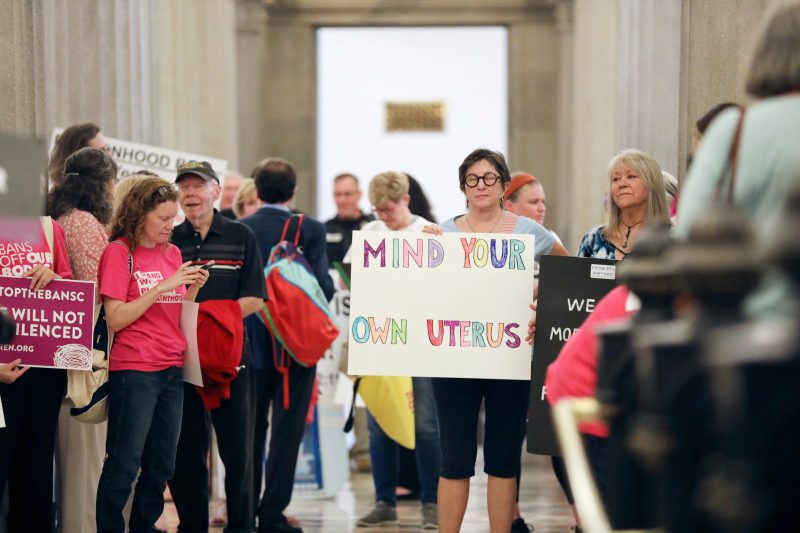South Carolina’s Supreme Court on Wednesday upheld a new law banning most abortions after roughly six weeks, a move that could once again shake up the nation’s abortion landscape in the Southeast.
The 4-1 decision is a reversal from January, when the court issued a 3-2 decision finding a similar law violated the right to privacy in the state constitution. That opinion was written by the state’s sole female justice, who has since retired because of the court’s age limits. The legislature replaced her with a male justice, making South Carolina the only state in the nation to have an all-male state supreme court.
Writing for the majority, Justice John W. Kittredge wrote that this year’s law was “materially different” from the previous version the court struck down.
“This new balance struck in the 2023 Act between the competing interests of the mother and unborn child was combined with the legislature’s new focus on contraceptives and early pregnancy testing, as well as a repeal of the statutes that codified the Roe v. Wade trimester framework,” Kittredge wrote. The U.S. Supreme Court’s 1973 Roe v. Wade decision legalized most abortion nationwide. The high court overturned Roe last year.
In late May, the state’s Republican-majority legislature passed a new “heartbeat” law banning abortion after fetal cardiac activity is detected after multiple failed attempts to impose even stricter limits. The law includes exceptions if the woman’s life is at risk or if continuing the pregnancy could cause her “substantial and irreversible physical impairment of a major bodily function.” It also allows abortions in the case of fetal anomalies and allows abortions before 12 weeks in rape and incest cases.
On the Senate floor, one key GOP leader said the bill was written in a way that attempted to skirt the justices’ objections to the original law passed in 2021. Barely 24 hours after Gov. Henry McMaster (R) signed the new ban into law this year, a South Carolina judge moved to pause the new abortion restrictions until the state’s highest court could review the measure. The move meant abortions were legal again in South Carolina up to 22 weeks of pregnancy.
After the opinion was released Wednesday, clinics immediately stopped performing abortions for patients who are more than six weeks pregnant. Catherine Humphreville, an attorney with Planned Parenthood Federation of America, said the group is seeking clarity from the court to confirm whether the ban took effect right away.
“This is already causing chaos and confusion throughout the state,” Humphreville told reporters on a call Wednesday. Abortion rights groups disagreed that the law was substantially different from the one struck down earlier this year.
The state quickly turned into an abortion battleground after the U.S. Supreme Court overturned the constitutional right to an abortion last year. The efforts in South Carolina revealed divisions among Republicans over enacting new restrictions, with the chamber’s five female senators — including three Republicans — becoming the most outspoken opponents of the bill banning abortion after roughly six weeks.
In January, Justice John Cannon Few declared unconstitutional the previous law — which was passed before Roe was overturned — but said he was in favor of upholding the new ban the legislature passed this year.
“I cannot say the abortion restrictions included in the 2023 Act are an unreasonable invasion of privacy,” he wrote in a separate concurring opinion Wednesday, noting that “the State’s interest in protecting the lives of unborn children is clearly articulated in the 2023 Act.”
Opponents of the measure call the ban extreme, while GOP lawmakers — such as state Sen. A. Shane Massey, the Republican majority leader — expressed concern that the state was becoming a destination for women seeking abortions.
State Sen. Katrina Shealy (R) had accused the ban’s supporters of “voting for political reasons” ahead of next year’s elections, adding she didn’t believe the restrictions were what the people of South Carolina want.
Antiabortion advocates cheered the court’s ruling.
“Today’s decision respects the compassionate will of South Carolinians and their legislators, who have repeatedly expressed their desire to protect babies from brutal abortions and provide true aid to mothers,” said Marjorie Dannenfelser, the president of Susan B. Anthony Pro-Life America, a leading antiabortion group.

